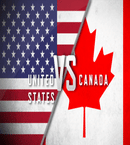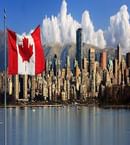Canada's Immigration Minister Sean Fraser has revealed intentions to get the immigration system back on track, as he begins the new year by reassessing the actions needed to modernize the immigration and permanent residence procedures. The first order of business was to provide $85 million in the 2021 Budget to improve processing times throughout the IRCC operations. In a statement highlighting the budget's importance, Fraser stated that by the end of the year, Canada would be able to resume processing service standards for study and work permits, as well as permanent resident card renewals, while also working to reduce processing times for proof of citizenship and visitor visas.
Read more: How to Immigrate to Canada?
The Immigration, Refugees and Citizenship Canada (IRCC) made its final judgment on 500,000+ permanent residency applications in 2021. Fraser did note, though, that Canada plans to make judgments on 147,000 PR applications by the first quarter of 2022, which is double the number seen in 2021. In February of this year, Canada would introduce a Permanent Residence Application Tracker for spouses and dependents, allowing applicants to check their application details and status online. These actions were taken in response to statistics, highlighting a longer processing time than that listed on the official website. In a letter issued on November 24, last year, the IRCC predicted a 20-month wait for application processing for the Foreign Skilled Worker Program (FSWP), far longer than the 6-month wait for Express Entry-managed programmes. In addition, the document mentioned an eight-month wait time for Canadian Experience Class application processing.
Read more: Canada Extends Online Study Period for PGWP Eligibility Until August 31, 2022
Fraser stated in a press statement that he understands the frustration created by the processing time delays. Nonetheless, he pledges to assist customers in travelling to Canada swiftly, with predictable processing timelines and effective contact with IRCC, which he considers to be his first focus. The IRCC has taken steps to reduce processing times:
- Recognizing the need to modernise IRCC operations in light of the pandemic's problems, the IRCC hired roughly 500 more processing employees, digitised the applications, and divided the work across IRCC locations throughout the world.
- Due to the pandemic's impact on in-person services, the IRCC had no choice but to move paper-based immigration to online services. The IRCC further stated that the online application site will be completely operational by the Spring or Summer of 2022.
- Average processing times for spousal sponsorship applicants had returned to 12 months, which is the usual service time for new applications. Also check out: In November 2021, Canada received almost 47,000 immigrants.
- In addition, a new gateway enabled a totally remote option, allowing Canadian residents to finish the entire procedure and even get permanent residency cards without having to deal with anybody in person. This portal was used by 225,000 permanent residents between June and December 2021.
- IRCC revealed the use of modern data analytics to speed up the Temporary Resident Visa application process, which does not deny or propose application refusals, which is something only IRCC immigration officials are permitted to do. This procedure, which was established in 2018, is said to speed up the application review process by 87%.
- When it comes to citizenship processing, the IRCC has implemented online testing, created an online application tracker, and staged virtual citizenship ceremonies. The future of citizenship in Canada appears to be even more digitized with people being able to self-administer their oath through signed attestation and then celebrate citizenship afterwards, reducing the time spent waiting for those towards the end of the process.
Read more: Canada Still is Top Destination Amongst Prospective Immigrants; Know More Here
Sean Fraser, Canada's Immigration Minister, recently addressed Canada's programme to assist international students, temporary foreign workers, and PGP, or Parents and Grandparents Program, and answered issues that aroused worries among many. While Fraser did not specify any work visa renewals for such applicants in this respect, he did highlight his mandate letter, which asks for pathways to PR for temporary international students and foreign employees. However, no final decisions have been made on the kind of programmes that may be offered.
In response to the FSWP drawings, Fraser described them as "temporary" and stated that Canada intends to resume the program's draws; however, no date was indicated in the interview. Nonetheless, Fraser expressed an interest in developing innovative ways to assist overseas students in seeing higher education in Canada as a "springboard" to permanent residency in Canada.
Read more: Travelling to Canada amidst COVID, check Travel Guidelines
When it comes to labour shortages, Fraser acknowledges that foreign workers are the driving force behind the increase in the labour force. Furthermore, because Canada is short on employees, Fraser expects the Trusted Employer Stream to lower obstacles for firms who have a solid track record of employing foreign workers. Furthermore, one of the five key topics addressed by Canada's budget of CA$85 million is strengthening the immigration system.
The Parents and Grandparents Program, however, is Fraser's largest issue as an immigration minister (PGP). Every year, approximately 200,000 applications are submitted for roughly 10,000 spots, according to Fraser. PGP, on the other hand, has been used as a lottery system for the past two years. While some have criticised the decision, claiming it is unjust to others who have been waiting for years, Fraser defended it, admitting that while some people are left hanging, "it does put everyone on an equal level."
![University of Toronto [U of T]](https://static.zollege.in/public/college_data/images/studyabroad/logos/college_104_25-12:44_University_of_Toronto-logo-2417C8AF32-seeklogo.jpeg?tr=w-50,h-50,c-force?tr=h-40,w-35,c-force)
![The University of British Columbia [Ubc]](https://static.zollege.in/public/college_data/images/studyabroad/logos/college_64_25-11:13_Capture.jpeg?tr=w-50,h-50,c-force?tr=h-40,w-35,c-force)
![McGill University [Mcgill]](https://static.zollege.in/public/college_data/images/studyabroad/logos/college_39_24-17:26_macgill.jpeg?tr=w-50,h-50,c-force?tr=h-40,w-35,c-force)
![University of Montreal [U de M]](https://static.zollege.in/public/college_data/images/studyabroad/logos/college_71_24-17:54_udem.jpeg?tr=w-50,h-50,c-force?tr=h-40,w-35,c-force)
![Simon Fraser University [Sfu]](https://static.zollege.in/public/college_data/images/studyabroad/logos/college_54_25-11:01_Capture.jpeg?tr=w-50,h-50,c-force?tr=h-40,w-35,c-force)
![University of Alberta [UAlberta]](https://static.zollege.in/public/college_data/images/studyabroad/logos/college_9_24-17:46_alberta-.jpeg?tr=w-50,h-50,c-force?tr=h-40,w-35,c-force)










